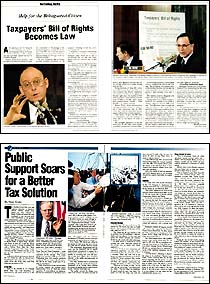
Constructive Tax Reform

| ||
 |
Among its many investigative features, Freedom exposed agency misconduct and contributed in no small part to passage in 1988 of the Taxpayers Bill of Rights. In 1989, Freedom was the first magazine to report on a new grass-roots movement to bring about a National Retail Sales Tax. |

ndisputably, the one province of government that causes the most friction between state and citizenry is the power to tax—especially when that power is abused. Many of Freedom’s investigations into government issues for the first two and a half decades of its existence were directed toward reform of the U.S. Internal Revenue Service (IRS).
The magazine was instrumental in bringing abuses by certain officials and agents of the IRS to public attention, while also seeking measures to safeguard the rights of all taxpayers. As part of its efforts, Freedom staff, working with current and former agents and employees of the tax agency, helped found an organization known as the National Coalition of IRS Whistleblowers.
In conjunction with the Coalition, Freedom published a 167-page white paper on the tax agency. In a 1985 letter accompanying copies of the white paper he sent to colleagues, Illinois Congressman Philip Crane commented, “Certainly, it reinforces the concerns many of us on both sides of the aisle have voiced regarding reports about the heavy-handedness of the IRS and its impact on our constituents.”
Among its many investigative features, Freedom exposed agency misconduct and computer errors that could have resulted in $1 billion in incorrect taxpayer assessments. The magazine’s public information efforts, extending over two decades and demanding an end to IRS abuses, contributed in no small part to passage in 1988 of the Taxpayers Bill of Rights.
In 1989, Freedom was the first magazine to report on a new grass-roots movement to bring about a National Retail Sales Tax (NRST) aimed at replacing the income tax and increasing the productivity of the nation and its citizens. In 1990, Freedom staff assisted in the publication of an award-winning booklet on the subject, Freeing the USA from the Income Tax, which helped to accelerate the grass-roots movement for such tax reform.
The movement expanded so rapidly that today more than 300 chapters of Citizens for an Alternative Tax System, the foremost proponent of a National Retail Sales Tax, exist in towns and cities throughout the United States, with some chapters including hundreds of active members. Experts have set forth the benefits of the NRST in Freedom, including Louisiana Congressman Billy Tauzin in a 1998 article. The concept of a National Retail Sales Tax is now widely recognized as having a workable and viable solution to the squeeze of taxation and production. It is incorporated in the works of some of the most advanced economic and social thinkers in the country and embraced by many political leaders from both major parties as the solution to America’s tax problems. A January 1998 report by the U.S. General Accounting Office said, “Based on recent proposals, a national RST might replace, rather than supplement, existing federal income, gift, estate, and excise taxes.”
The solution promises to be one of the most constructive reforms for government yet.
The following article on the National Sales Tax was contributed to Freedom by U.S. Congressman Billy Tauzin in 1998.

